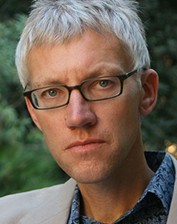
“What do the Charlie Hebdo murders and the rise of the Islamic State owe to Islam? It would be comforting to insist, as many have done, that they owe nothing at all; but Holland, in the inaugural Christopher Hitchens Lecture, argues that the truth is more complex. The best way to combat jihadism, he proposes, is to recognise the centrality of Muhammad to Islam – and that he comes in many forms. There is the moral leader who swallowed abuse peaceably; and there is the war leader who ordered people who insulted him put to death. How best, then, to de-radicalise the Prophet? Tom Holland is author of In The Shadow of the Sword, Rubicon, Persian Fire, Millenniumand the new translation of The Histories by Herodotus. Chaired by Katrin Bennhold of the New York Times.” — from the Hay Festival program.
Denouncing Islamic State as not representing “true Islam” is a well-intentioned declaration but counterproductive and seriously problematic, according to historian Tom Holland in the inaugural Christopher Hitchens Lecture at the May 2015 Hay Festival. The title of his talk is De-Radicalising Muhummad (available online).
What is wrong with these well-meaning efforts to defuse anti-Islamic tensions?
What it does is imply that there is a normative, authentic Islam, one that embodies ideals that are perfectly compatible with liberal, secular Britain, and then there are misinterpretations of it, distortions of it, that are not really Islam at all. . . . .
Playing the same lethal game as Islamic State
By denying the title of Muslims to Islamic State Western governments are actually playing the same lethal game as the Islamic State themselves. Because what the Islamic State do is to condemn other Muslims as either apostates or heretics — the better then to justify their elimination.
I really don’t think it is for Prime Ministers or Home Secretaries to play that game. Because once you take it on yourself to define what is or isn’t authentic Islam then you are buying into the notion that such a thing as authentic Islam actually exists.
Now if you’re a believer of course that’s fine. You will accept that indeed Islam was given to you by God and therefore it does have some absolute Platonic essence.
But if you’re not a believer then a religion is just like any other manifestation of human culture. It’s something that is porous, variable, forever mutating, and evolving. It’s a dialogue between people in the present and an inheritance of texts and traditions and people can choose what of those texts and traditions they wish to emphasise.
So it’s not like religion is the equivalent of a radio station set with a dial and you can definitely find it. It’s a whole series of points on a bandwidth.
That understanding ought to give us hope, however long-term it may have to be. It certainly ought to contribute to a lessening of social prejudice and a promotion of constructive ways of addressing the problem of violent Islamic groups and individuals.
And obviously what a definition of an extremist is, what a radical is, will depend where you stand on that bandwidth. Because it cannot be emphasised enough that jihadists do not think of themselves as extremists. To them, it’s us, the comfortably secular and liberal kind of people . . . who are the extremists. Jihadists see themselves as models of righteous behaviour. They see themselves as doing God’s will as expressed in the pages of his holy book the Koran and the sayings of his prophet Muhammad. And they also see themselves as obedient to something else — to the example of Muhammad. The Koran is absolutely explicit about this. In the Messenger of God it says you have a beautiful example, an example to follow.
And so it does matter then, to jihadis no less than to the vast majority of Muslims who would never in a million years set about destroying the antiquities of the Near East, or taking sex slaves, or murdering those who mock the Prophet. But sanction for what they do is indeed to be found within the various biographies and traditions that are associated with the Prophet.
So what does Tom Holland see as the appropriate response? Continue reading “De-Radicalising Muhammad”
